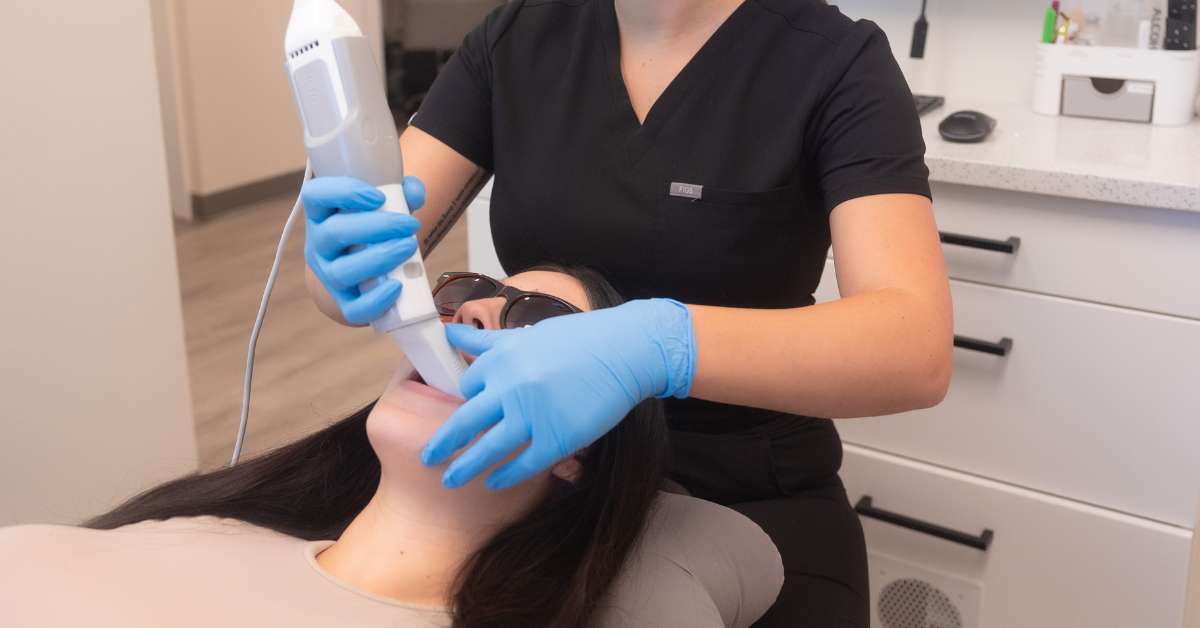If you’ve ever experienced a headache that starts around your jaw or feels connected to your jaw movements, you might be dealing with a TMJ headache.
TMJ stands for temporomandibular joint, which is the joint that connects your jaw to your skull.
When strained or misaligned, this joint can lead to headaches and other discomforts. But is a TMJ headache something to worry about?
Let’s examine TMJ headache is dangerous or not, their causes, and whether they pose any risks to your health.
Key Takeaways
- TMJ headaches are often caused by tension, grinding, or clenching of the jaw.
- While not life-threatening, TMJ headaches can impact your quality of life if untreated.
- Effective treatments include lifestyle changes, dental appliances, and medical intervention.
- Regular dental visits can help detect TMJ issues early and prevent you from developing more severe complications.
What is a TMJ Headache?
A TMJ headache is caused by issues in the temporomandibular joint (TMJ), which connects your jaw to your skull. Movement around this joint allows you to chew, speak, and open your mouth.
When this joint is stressed or misaligned, it doesn’t only lead to pain in the jaw—1 in 4 people experience pain in their head.
People often describe TMJ headaches as dull, aching pain that can worsen with jaw movements or after long periods of clenching or grinding.
TMJ Headache Is Dangerous or Not?
A TMJ headache is not dangerous, though it can be quite uncomfortable and disruptive. However, if left untreated, TMJ issues can lead to more chronic pain conditions, damage the joint over time, or contribute to other conditions like:
- Chronic Headaches or Migraines: TMJ pain is often ongoing, which can lead to regular headaches or even trigger migraines.
- Jaw Joint Damage: Over time, stress on the temporomandibular joint can lead to issues like cartilage damage or inflammation.
- Worn Teeth: Grinding or clenching, which is associated with TMJ issues, can wear down teeth and cause further dental complications.
So, whether a TMJ headache is dangerous or not depends on how quickly you treat it. Although painful, the headache isn’t a major cause of concern.
However, if you don’t fix the problems with your jaw, these headaches can lead to bigger issues with your head, jaw, and teeth.
How Can You Tell If Your Headache is from TMJ?
TMJ headaches often feel different from regular headaches. You might notice:
- Pain or soreness around your jaw, especially when you chew or open your mouth wide.
- A clicking or popping sound in your jaw joint.
- Pain that radiates to your temples, ears, or neck.
- Tightness or discomfort when you move your jaw.
How Are TMJ Headaches Treated?
Like other types of headaches, TMJ headaches can be relieved with over-the-counter painkillers. You can also try applying heat or ice to the jaw or massage your jaw to help the headache go away.
To prevent these nasty headaches from coming back, you might also want to try:
- Lifestyle Changes: Reducing stress, avoiding hard or chewy foods, and practicing good posture can help relieve TMJ headaches.
- Dental Appliances: Mouthguards or splints can prevent you from grinding and clenching your jaw, offering headache relief and protecting your teeth.
- Physical Therapy: Jaw exercises and stretches can improve flexibility and relieve tension. This can prevent TMJ headaches and help reduce tooth damage.
- Medical Treatments: In more severe cases, a dentist or doctor may recommend medication, injections, or even surgery to correct TMJ issues.
FAQs: Is TMJ Headache Dangerous or Not?
Q: Are TMJ headaches dangerous?
A: While they aren’t typically life-threatening, TMJ headaches should be treated. Otherwise, they can lead to chronic pain or damage to your teeth and TMJ joint.
Q: Can TMJ headaches go away on their own?
A: TMJ headaches may improve with lifestyle changes, such as reducing stress and avoiding overly chewy foods, but many people need to use other treatment options.
Q: Should I see a dentist for a TMJ headache?
A: Yes! A dentist can diagnose TMJ issues and recommend the best treatments to help reduce pain and prevent damage to your teeth and jaw.
Don’t Let TMJ Headaches Go Untreated
TMJ headaches might not be life-threatening, but they can seriously impact your quality of life.
Whether you’ve just started getting them, have let them go untreated for too long, or want a dental check-up to catch any issues early, Le Dental Spa can help at any stage.
From relieving occasional headaches and improving jaw alignment to restoring your smile, our team is here.
Contact us today to discuss your options, or register as a new patient to book your appointment.





